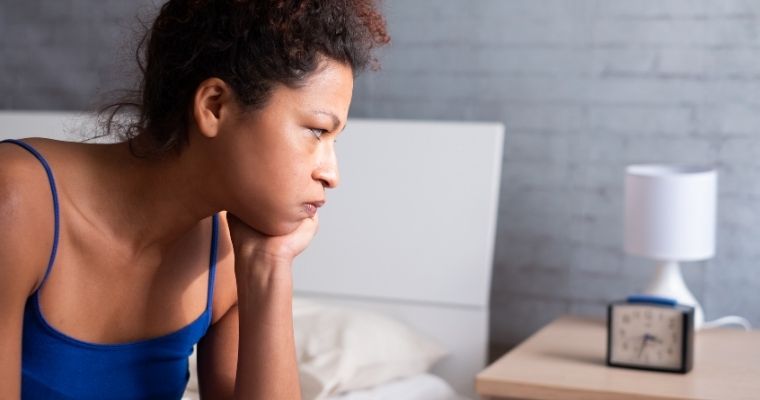There are many things that can interrupt a good night’s sleep. From falling asleep to staying asleep, there are common barriers that you can overcome if they tend to get in the way. Some barriers are easier than others but with conscious effort, you can stop losing sleep and start loving bedtime again. Here are some tips on how to get to sleep when you can’t.

Common Sleep Barriers
Some of the common barriers to sleep are:
- Overwhelm
- Anxiety and worries
- Being a light sleeper (like me!)
While these aren’t the only reasons people don’t get enough high-quality sleep, they do account for a large percentage of people who suffer sleepless nights. Here’s how to tackle these barriers and overcome them.
Tackle overwhelm and get back in control
Overwhelm is usually a mixture of things you can and can’t control.
Tackling the things that you CAN control.
Reduce your schedule to what you can handle at this moment in time. This might mean cutting back on responsibilities and extra activities.
Delegate when possible
Hand over important tasks that aren’t essential for you to complete. Allow or require someone else to manage them until you aren’t overwhelmed. Outsourcing work tasks can lessen the load and reduce overwhelm.
Ask someone else in your household to do jobs for you. Don’t try to do everything yourself.
Tackling the things you CAN’T control
Put your focus and energy on solving any problems that are causing you to overwhelm. Even if you can’t control the situation, you can control your reaction to it.
Tackle anxiety and worries and fall asleep
Falling asleep when your mind is racing is really hard to do. Sometimes bedtime is the only time you can’t distract yourself from what you’re anxious and worried about. That can make bedtime stressful.
If you suffer from acute anxiety, you might benefit from outside help. Your doctor can help you with treatments that can help alleviate anxiety and worries when they are too intense to manage other ways.
Simple activities like drinking chamomile tea, taking an aroma-therapy bath, or unwinding with a good book can help reduce worries and stress before bedtime.
Don’t watch the news and turn off any devices. Avoid social media too. Watching tv and having devices on before bed can keep you awake longer and prevent you falling asleep.
Tackle sleep distractions and stay sound asleep
Being a light sleeper can make staying asleep hard. Finding the best ways to eliminate sound and other stimulation can help. *Sound reducing curtains like these may help if there is a lot of outside noise, they also reduce light.
Use exercise to help you sleep better
Physical exertion is an excellent way to combat sleeping lightly. Regular physical activity including *cardio and weights can help tire your body out and make you more likely to sleep deeply at night. Going for a daily walk in the fresh air helps enormously too.
Have a good sleeping environment
Your bedroom can be a haven for great sleep or possibly a hell. Have a room that is free from noise, light, and other distractions. If you are disturbed by neighbours and noises outside, *earplugs can help to reduce noise and help you get to sleep.
Ensure your bedclothes and your bedding are soft and non-irritating. Making sure all of your senses are comfortable and able to rest during sleep will help light sleepers stay asleep.
There are many distractions that cause poor sleep. Overcoming the ones that affect you most can help you sleep better, longer, and deeper.


